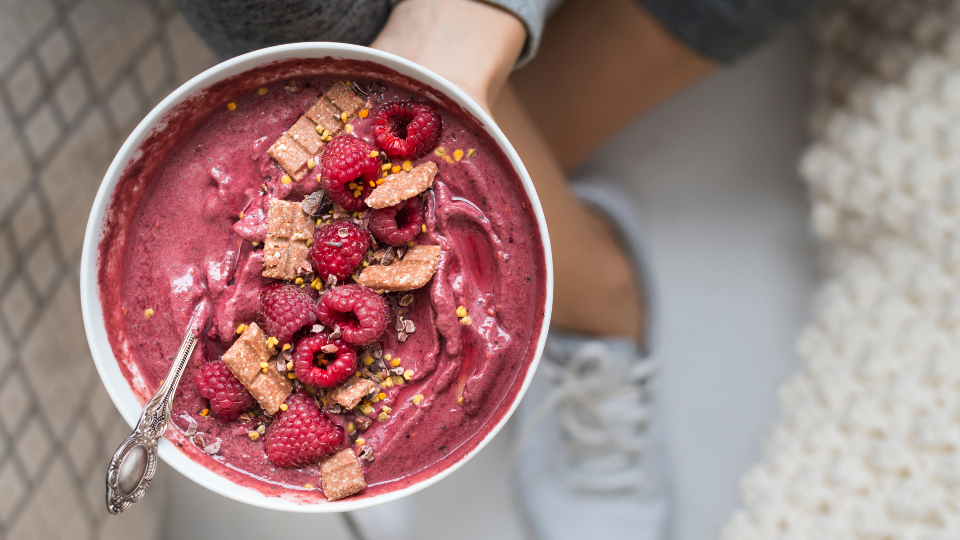Runners need to fuel their runs with quality nutrients in order to level up their PBs and take on the next track. We already knew that.
The trickier questions pertain to how runners can balance their macro and micronutrient intake to achieve their goals. Is a caloric deficit required if you’re running 30+ kilometers a week and looking to lose weight? How much should you be eating when training for a marathon? What can you do if you have a food allergy?
Let’s take a look at some basic macro and micronutrient facts and how you can ensure you get enough of both.
A Macro Balance

Runners need the usual three macronutrients: carbs, fats, and protein. However, they need them in slightly varying amounts than the non-runner population.
Carbohydrates are the main macro you need to base your diet around. The body prefers them as a fuel source, and when it doesn’t get enough of them, it will start breaking down protein for fuel. This will leave you feeling drained, and it can throw quite the spanner in your performance and even your general health.
You also need to ensure you’re getting enough protein – ranging between 1.0 and 1.6 grams per kilogram of bodyweight per day. This will aid recovery and ensure your muscles remain strong and able to carry you all that distance.
The easiest way to ensure you’re getting enough protein is to use a protein powder. If you have a food allergy or food intolerance, make sure you go for a source of protein that doesn’t contain these ingredients. Bloating and gastrointestinal troubles will hinder your performance.
As for fats, they are the better energy source if you’re looking to hit a high calorie intake. However, the body doesn’t break them down as efficiently, so they can’t be the main macro on your plate. Go for 1 gram per kilogram of bodyweight per day of fat intake.
The Importance of Carbs

To ensure peak performance and prevent injury, you want 45 to 65 percent of your daily caloric intake to come from carbs. For most runners, this is around 130 grams of carbs per day.
The best way to ensure you meet this level of carb intake is to eat carbs with every meal, including your snacks.
Be mindful of the difference between complex and simple carbs as well. Complex carbs – oats, beans, fruits, and veggies – are digested longer. This means that they can cause bloating and other issues if you consume them before a run.
Your body breaks down simple carbs faster, so they will provide practically immediate energy. Sodas, milk, candies, sports gels, and, of course, plain sugar all fall into this category.
Neither complex nor simple carbs are a bad or a better option. Both will provide the energy you need – all you have to figure out is what combination of carbs fuels your workouts best.
The Micronutrients

Make no mistake, micronutrients are just as important as your macros. We consume less of them, but all of them are important and necessary. There are five micronutrients that are especially important for runners:
Calcium
When you don’t consume enough calcium, your body will start extracting it from your bones. This makes them more brittle and thus opens a wide window for injury. As calcium plays an important role in muscle contractions as well, you can’t expect to run well without it.
The best sources of this mineral include kale, broccoli, and almonds. Supplementation can be an avenue worth exploring, too.
Magnesium
Magnesium is a key component in the bodily processes that regulate energy levels. Furthermore, it’s also incredibly important for enabling muscle contractions and dispersing neuromuscular signals. If your legs are cramping on a run, you’re probably low on magnesium.
Paired with calcium, it also helps keep your bones healthy and your blood pressure steady.
Avocados, bananas, almonds, dark chocolate, and yogurt are all great sources of magnesium.
Sodium
Sodium is an electrolyte that keeps your muscles working and manages the fluid levels in your body. You naturally lose it while sweating, which is why it’s important to keep your sodium levels optimal when running.
Salt is a great source of sodium, as are electrolyte drink mixes you can take mid-run. However, you do want to monitor your salt intake to avoid over consumption as it has been attributed to certain health conditions like impacting blood sugar levels.
Iron
Iron deficiency is a very common cause of fatigue and breathlessness in runners (and the general population as well). Iron is used to produce hemoglobin, the compound that transports oxygen from the lungs to the rest of the body. Without it, you’ll simply feel drained, and you won’t be able to perform as well as you normally would.
Liver is a great source of iron, but you can also find it in spinach, lentils, and dark chocolate. Iron supplements are also an option, but it’s best to consult your doctor first.
Zinc
We all know that a weakened immune system equals subpar or skipped runs. Well, zinc is vital for your immune system to keep functioning normally, plus it plays an important role in recovery. If you train hard and run long distances, you may be susceptible to a zinc deficiency.
Pumpkin seeds and chickpeas are a great source of zinc. You can also go for spinach, mushrooms, or cashews.
The key to ensuring all of your micronutrient needs are met is eating a versatile diet. While there’s nothing wrong with having several favorite staples, make sure your veggie and fruit plate is versatile and that you vary your main carb source daily.
The easiest way to achieve the proper balance is to plan meals every week and to only purchase ingredients you know you will be consuming. That way, all of the guesswork will be eliminated from the equation, and you’ll be able to focus on the track rather than the kitchen.
Final Thoughts

Getting your macro and micronutrient intake right can infinitely level up your runs. And while you may become quite obsessed with weighing every morsel of food you eat at first, you’ll learn how to intuitively track your macros. Soon enough, you won’t need to reach for the scales and charts as often.
Remember that we are all individuals and what works for one runner may not work for you. So, start with the recommended macro intakes we’ve listed, and then tweak them if necessary to better fit your specific training style.





